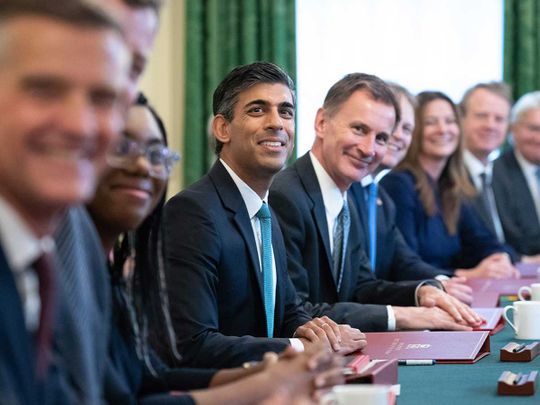
UK Prime Minister Rishi Sunak pledged to reduce the national debt and cut inflation as he set out his priorities for the coming year against a backdrop of mounting strikes, a creaking National Health Service and dire poll ratings for his ruling Conservative Party.
The economic goals were among five priorities outlined by the prime minister in his first set piece remarks of the year. He also outlined promises to grow the economy, tackle immigration and improve health care provision.
“Those are the people’s priorities,” Sunak said in a speech in east London on Wednesday. “They are your government’s priorities. And we will either have achieved them or not. No tricks, no ambiguity: we’re either delivering for you or we’re not.”
In office for less than three months, Sunak is battling multiple crises including disruption to the NHS and rail services due to industrial action, a record cost-of-living squeeze and an economy that may already be in recession. With the Tories trailing the main opposition Labour Party by more than 20 points in recent polling, Sunak is under pressure to show he has a vision for the country.
The five pledges outlined by Sunak are:
While lines pre-briefed by his office suggested Sunak aimed to deliver on his five promises in the current parliament - which runs until January 2025 at the latest - he later clarified that the pledge on debt is to get it falling in the “medium term”. That gels with plans announced in November by Chancellor of the Exchequer Jeremy Hunt for debt to peak in the 2025-26 fiscal year, before falling.
The other economic promises are already predicted. The government’s fiscal watchdog, the Office For Budget Responsibility, forecasts inflation falling to 3.8 per cent by the end of the year from a peak of more than 11 per cent last year. And while the OBR forecasts a recession lasting more than a year, it sees the economy growing - just - at the end of the year.
The premier is trying to show he has a grip on the challenges besetting his administration. Health Secretary Steve Barclay conceded on Tuesday the NHS is under “massive pressure”, with hospitals across the UK declaring critical incidents and patients being warned of long waiting times even in emergencies. Delays to emergency care could be causing 500 deaths a week, according to Dr. Adrian Boyle, president of the Royal College of Emergency Medicine.
That’s exacerbated by the threat of more strikes over pay and conditions by nurses and ambulance workers later this month, after they also took action in December. Industrial action has also been paralysing Britain’s transport system this week, with a rail worker strike disrupting the return to the office after the Christmas break.
The protests have been triggered by growing anger over pay deals that fail to keep pace with inflation that soared last year to a four-decade high. Sunak has been resisting higher wage demands in the public sector, arguing they would further stoke rising prices.
Overnight, the premier’s office trailed part of his speech that focused on a pledge to make all pupils in English schools learn some form of math until the age of 18, with Sunak saying education reform is “personal” for him. That led Labour to point out the government has repeatedly failed to meet its recruitment targets for math teachers.












